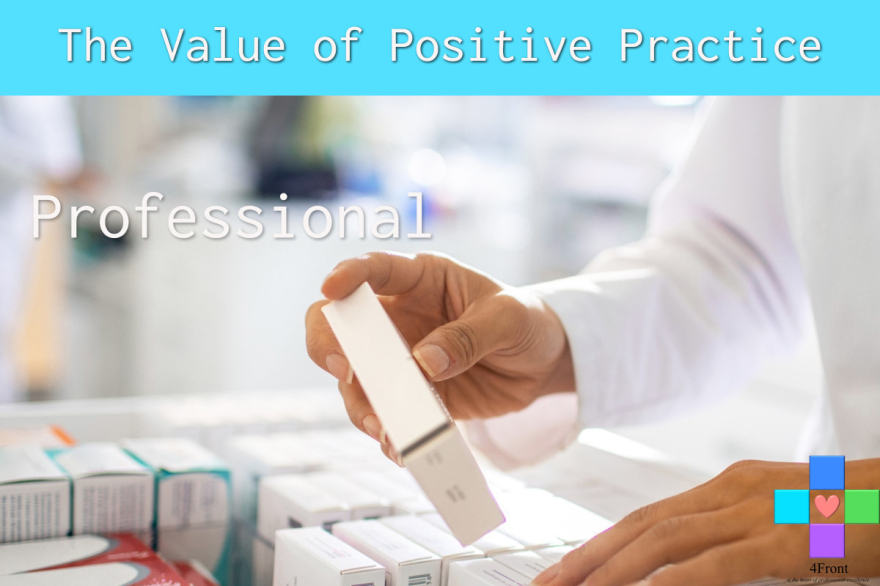Professional | The Value of Professional Development in Cultivating a Positive Pharmacy Practice
 The Value of Professional Development in Cultivating a Positive Pharmacy Practice
The Value of Professional Development in Cultivating a Positive Pharmacy Practice
Introduction: In the ever-evolving landscape of healthcare and pharmacy, excellence isn't just a goal—it's a necessity. Creating a positive pharmacy practice that excels in patient care and inspires teams requires not only the right mindset but also the right practices. This journey from mediocrity to positivity is where the true transformation begins.
Understanding Mindsets and Practices: Before we dive into the journey, let's clarify what we mean by mindsets and practices. Mindsets are the underlying attitudes and beliefs that shape our actions and decisions. Practices, on the other hand, are the actions and behaviors that result from these mindsets. A positive pharmacy practice is rooted in both the right mindsets and the right practices.
The 6Ps Framework for Positive Practice: Our "6Ps of Pharmacy Excellence Self-Assessment Quiz" serves as a roadmap for cultivating a positive pharmacy practice. Let's explore how this framework empowers pharmacy professionals to embrace the right mindsets and practices:
- Purpose: Purpose-driven mindsets inspire leaders to align their actions with their values and the greater mission of healthcare. The practice of setting a clear purpose fosters meaning and direction in the workplace.
- Personal: Personal growth mindsets prioritize well-being, resilience, and emotional intelligence. The practice of continuous personal development equips leaders with the tools to manage stress and adversity effectively.
- Professional: A commitment to professional growth and adherence to industry best practices are essential. Continuous learning is the practice that ensures pharmacy leaders remain current and at the forefront of their field.
- People: Building strong relationships and fostering teamwork require the right mindset. The practice of effective teamwork creates a collaborative and patient-centric environment.
- Products & Services: Understanding customer needs and communicating value is vital. The practice of aligning products and services with customer expectations ensures patient satisfaction.
- Prosperity: A prosperous pharmacy enables growth and innovation. The practice of driving prosperity ensures the organization thrives, creating a positive environment for all.
The Science Behind Positive Practice: Scientific research supports the idea that positive leadership leads to increased job satisfaction, higher patient satisfaction, and improved team performance. Positive mindsets and practices aren't just beneficial; they're essential for success in pharmacy practice.
The Perils of Mediocrity: Conversely, settling for mediocrity can lead to stagnation, low morale, and decreased patient satisfaction. When pharmacy professionals operate with negative mindsets or engage in suboptimal practices, it affects not only their performance but the entire practice.
How Healthcare Leadership Coaching Can Help: This is where healthcare leadership coaching, guided by experts like Rachel Dungan, 'The Pharmacist Coach,' becomes invaluable. Coaching bridges the gap between negative or mediocre mindsets and truly positive ones. Here's how it can help:
- Identifying Negative Mindsets: Coaching helps individuals recognize and overcome negative thought patterns and beliefs that hinder their growth and effectiveness.
- Cultivating Positive Mindsets: Coaches guide pharmacy professionals in developing attitudes of empathy, resilience, and a growth mindset—the foundational elements of positive practice.
- Setting Clear Goals: Coaches work with leaders to define clear, actionable goals for their professional development, aligning them with personal values and the pharmacy's mission.
- Building Resilience: Through coaching, individuals learn strategies to manage stress, adversity, and setbacks, fostering a thriving pharmacy practice.
- Inspiring Teams: Coaches provide techniques and tools to inspire and engage teams, promoting collaboration and patient-centered care.
Conclusion: The value of professional development in cultivating a positive pharmacy practice cannot be overstated. It leads to higher patient satisfaction, a motivated team, and an environment where excellence thrives. Healthcare leadership coaching, especially with experts like Rachel Dungan, 'The Pharmacist Coach,' provides the guidance and tools to bridge the gap between negative or mediocre mindsets and truly positive ones. It's a journey worth embarking on—one that promises not only professional growth but also personal fulfillment and a thriving pharmacy practice.
